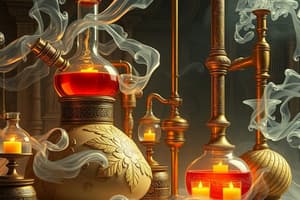Podcast
Questions and Answers
Why are liquids more ordered than gases?
Why are liquids more ordered than gases?
- Because liquid particles are farther apart than gas particles
- Due to the low density of liquids
- Because liquid particles have higher mobility than gas particles
- Because of the stronger intermolecular forces and lower mobility of liquid particles (correct)
What causes the attraction between particles in a liquid?
What causes the attraction between particles in a liquid?
- London dispersion forces only
- Hydrogen bonding only
- Intermolecular forces of attraction such as dipole-dipole forces, London dispersion forces, and hydrogen bonding (correct)
- Dipole-dipole forces only
What is the main difference between liquids and gases?
What is the main difference between liquids and gases?
- Liquids are denser than gases while gases are less dense than solids.
- Liquids have an indefinite shape while gases have a definite shape.
- Liquids have an indefinite volume while gases have a definite volume. (correct)
- Liquids have weaker intermolecular forces than gases.
What term is used to describe the process of a liquid changing to a gas?
What term is used to describe the process of a liquid changing to a gas?
What is the process called when a vapor returns to the liquid state?
What is the process called when a vapor returns to the liquid state?
In closed containers, why does the volume of the liquid remain unchanged after some time?
In closed containers, why does the volume of the liquid remain unchanged after some time?
In what phase do molecules on the surface of a liquid break away from the liquid?
In what phase do molecules on the surface of a liquid break away from the liquid?
What happens to most of the molecules that escape into the vapor phase during evaporation?
What happens to most of the molecules that escape into the vapor phase during evaporation?
What causes the rate of condensation to increase in a closed container with liquid water?
What causes the rate of condensation to increase in a closed container with liquid water?
What is the vapor pressure of a liquid?
What is the vapor pressure of a liquid?
Which process involves a liquid turning into a gas?
Which process involves a liquid turning into a gas?
What happens when the rates of condensation and evaporation become equal in a closed container?
What happens when the rates of condensation and evaporation become equal in a closed container?
Flashcards are hidden until you start studying
Study Notes
Properties of Liquids
- Liquids have a definite volume, but an indefinite shape, taking the shape of their containers to the level they fill.
- They are denser than gases, but less dense than solids.
- Liquid particles are in constant motion, but are closer together than those in a gas.
- Attractive forces between particles in a liquid are stronger than between particles of a gas, due to intermolecular forces of attraction.
- Liquids are more ordered than gases due to stronger intermolecular forces and lower mobility of liquid particles.
Vaporization and Evaporation
- Vaporization is the process by which a liquid changes to a gas.
- Evaporation is the process by which molecules on the surface of a liquid break away and go into the gas phase.
- Molecules on the surface of a liquid are held less tightly than those in the interior, allowing the most energetic molecules to break away into the gas.
- Evaporation is explained in terms of the energy that the molecules on the surface of the liquid have.
Evaporation in Open and Closed Containers
- In an open container, evaporation continues until all of the liquid enters the gas phase.
- Most molecules that escape into the vapor phase do not collide with the surface of the liquid and return to the liquid phase, but instead diffuse through the gas phase away from the container.
- In a closed container, the volume of the liquid decreases for some time, and then remains unchanged, as the vapor cannot escape.
- As more molecules leave the liquid, more gaseous molecules collide with the container walls, with each other, and with the liquid surface, and return to the original liquid state.
Condensation and Dynamic Equilibrium
- Condensation is the process of a vapor returning to the liquid state.
- Evaporation and condensation are opposing processes.
- In a closed container, the rate of condensation increases as the number of gaseous molecules increases, eventually reaching dynamic equilibrium.
- At dynamic equilibrium, the rates of condensation and evaporation become equal, and the number of gaseous molecules above the liquid remains constant.
- The vapor pressure of a liquid is the partial pressure of its vapor in dynamic equilibrium with its liquid.
Studying That Suits You
Use AI to generate personalized quizzes and flashcards to suit your learning preferences.




